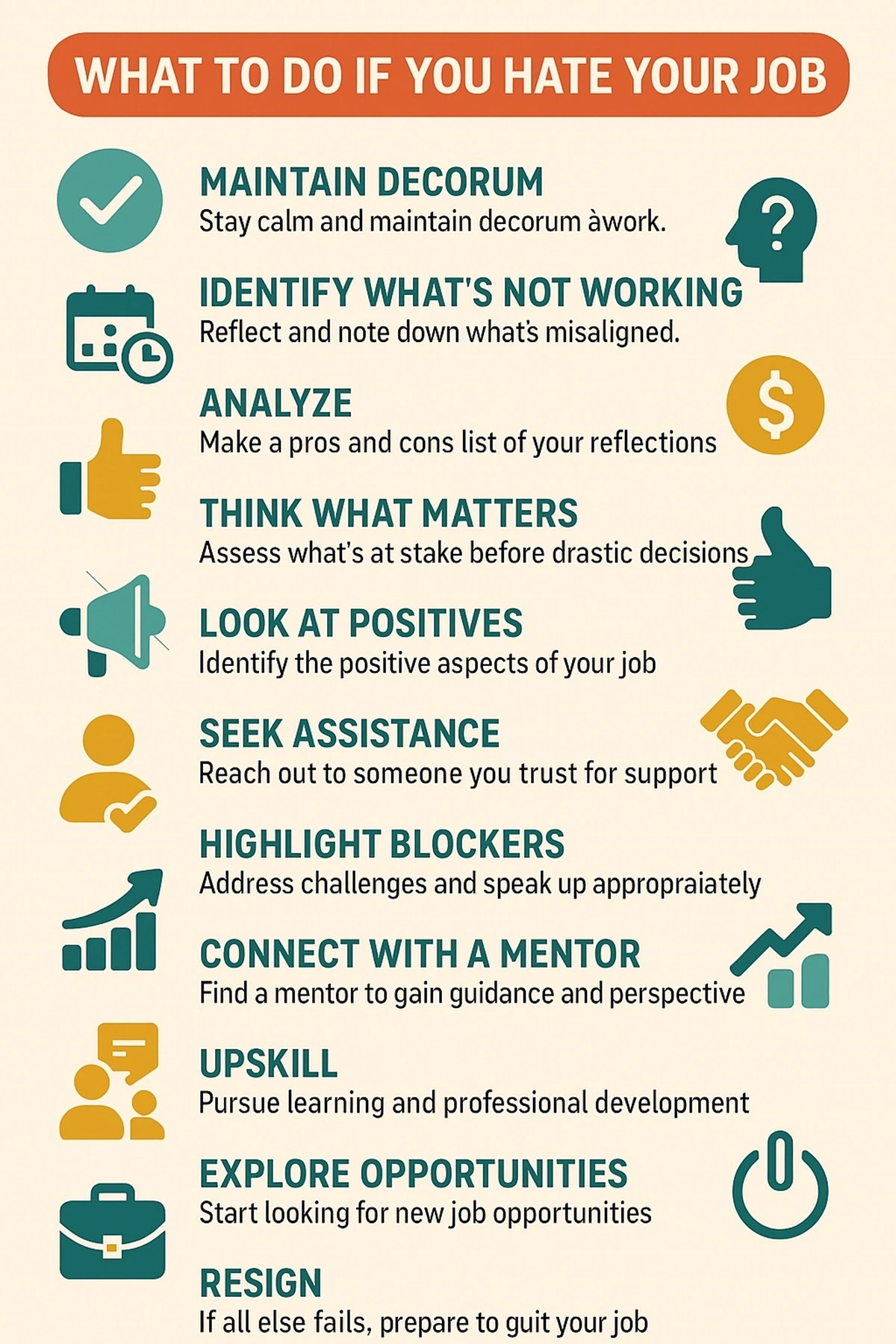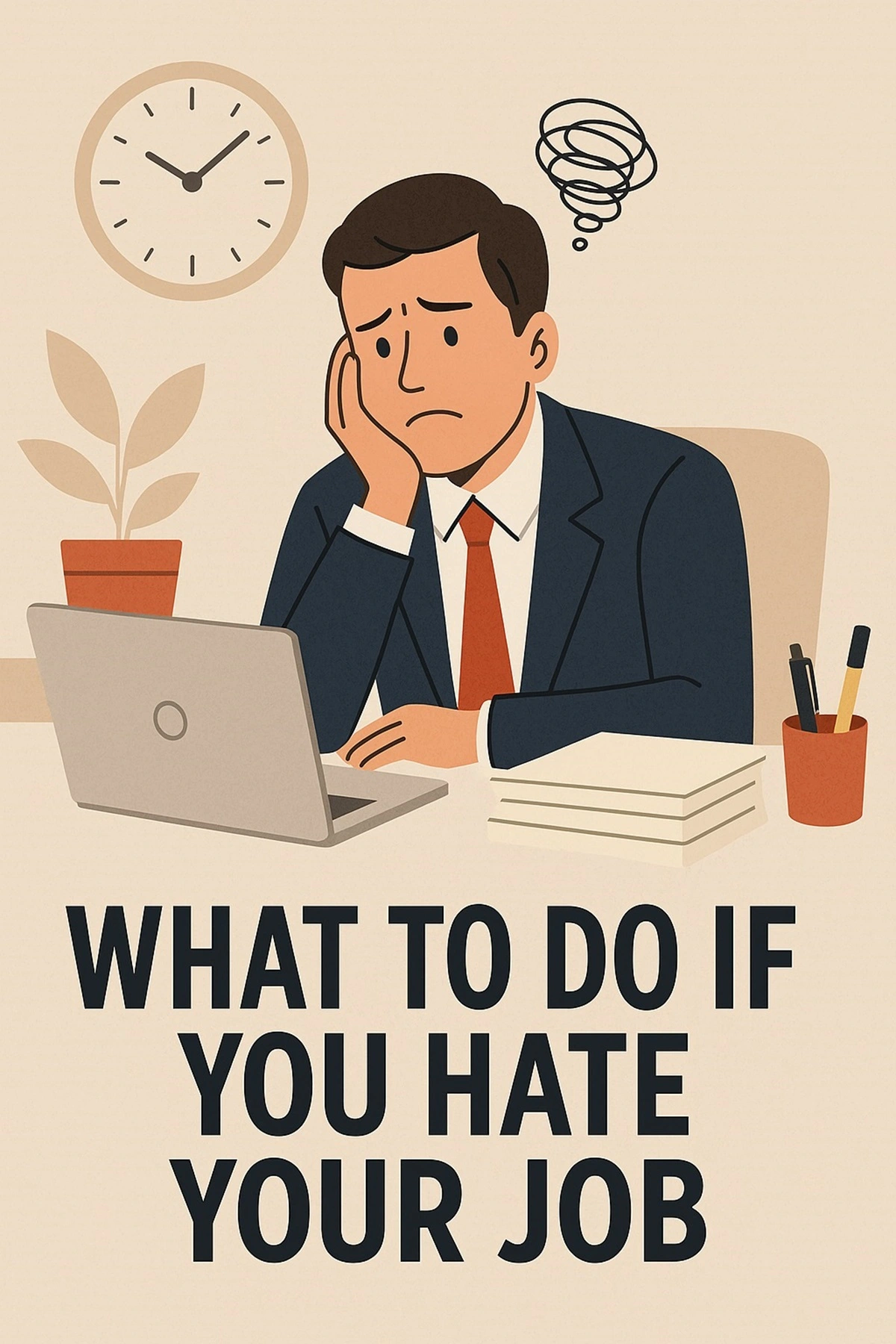Let me ask this question straight – What do you do when you hate your job? – Resign! I’m sure many of you have this as your first thought, but putting down your papers isn’t the ideal solution for most of us, especially for those having significant responsibilities and dependencies. So, what should I do if I hate my job? Here are 12 useful tips on what to do when you hate your job.

What To Do When You Hate Your Job – 12 Helpful Tips
- Maintain Decorum: First and foremost, it is important to stay calm and maintain decorum. Many people, out of frustration, take impulsive actions that result in losing their jobs unnecessarily. When you’re visibly frustrated, your displeasure becomes apparent, and others in the workplace may take advantage of it. Therefore, it is essential to remain compliant with company policies and continue fulfilling your responsibilities as per expectations.
- Identify What’s Not Working: Expressing your inner thoughts is always helpful. Take time to reflect calmly and identify what isn’t working in your job. Note down specific aspects that seem misaligned. It is important to unrestrict your thoughts and allow them to flow naturally, and list the key points clearly.
- Analyze: Create a structured pros and cons chart to articulate your reflections. This exercise often reveals the underlying reasons for job dissatisfaction. Identifying and addressing these issues is typically more effective than hating your job or company.
- Take Time Off: A study published in the International Journal of Manpower suggests that access to time away from work is associated with lower turnover for all workers, both men and women. Offering PTO (Paid Time Off) reduces the likelihood of quitting by 35% overall, with a greater reduction for men (41%) than women (28%). However, PTO does not affect job satisfaction, and job satisfaction independently reduces turnover by 30 to 40%. The time off is a good way to step back and take a rest. This time can be effectively utilized to review the reflections you wrote above.
- Think What Matters: It is true that not everyone is happy with their job, yet many aspects of life depend on it. Before making any drastic decision, it is important to assess what’s at stake. Your job supports household expenses, bills, EMI payments, and various other financial commitments. Understanding which needs your income fulfills—and how essential those needs are at this point in your life. It can help you reflect on whether hating your job is justified or if it is a temporary dissatisfaction.
- Look at Positivies: According to psychology, frustration is a symptom, not a root cause for most of the problems we face in life. Chronic frustration evolves into deeper resentment and job hate. Rather than focusing solely on the negatives, it’s important to recognize the positive aspects of your job. No one is paid without reason—you are compensated for the time you invest and the quality of work you deliver. No matter how challenging a job may be, it always has some positive elements. Identifying and focusing on these can help you grow and develop as a professional.
- Seek Assistance: It is always a viable option to reach out to someone you trust and share your concerns related to your job. Many employers also offer Employee Assistance Programs (EAPs), which can be extremely helpful in such situations. As per the LinkedIn post, nearly 71 million workers in the US have access to an EAP but yet the utilization rate of these programs still ranges between 3-7%. According to Verified Market Research, the EAP market was “valued at USD 7,104 Million in 2023 and is projected to reach USD 10,934 Million by 2031, but its actual value benefits are yet to be derived.
- Speak Up: According to DecisionWise, 34% of the US employees don’t speak up for fear of retribution. Speaking up and addressing challenges and blockers directly can be an effective way to ease frustration related to job dissatisfaction. Often, people suppress their concerns and fail to escalate them appropriately, which leads to growing resentment toward their job. Serious issues such as abuse, sexual harassment, or unethical practices should be escalated to the right authority to ensure they are properly addressed.
- Connect with a Mentor: Find a mentor within your organization or outside your organization, such as on LinkedIn. According to MentorCliq, 90% of the workers who have mentors report being happy in their jobs, and employees who were involved in mentoring reported a 50% higher retention rate than those not involved in mentoring. These programs are useful if you have a mentor from the same industry so that they can help you understand the wider landscape of your job, apart from the limited perspective that you have within your organization.
- Upskill: As per MeritAmerica, by 2025, half of all employees will need upskilling to remain competitive in the era of AI and automation. career objective. Learning new and emerging skills beyond your current role can significantly benefit you during a job switch. You may also consider pursuing advanced certifications in your field, which can enhance your prospects of securing a better role in the future.
- Explore Opportunities: You should begin exploring new job opportunities, whether within your current organization or externally. Your professional network, skillset, and job portals can play a key role in helping you find a suitable role. If you’re unhappy in your current position, it may be time to look for a different role that aligns with the skills you are already working to develop. Consider joining communities related to your desired field, as they can increase your chances of finding the right opportunity. Sometimes, switching fields altogether can lead to greater job satisfaction.
- Resign: According to The Guardian (May 2024), employees who choose to quit instead of sticking earn four times faster, and also reported improved well-being after walking away from stressful roles, showing that quitting can be empowering when work becomes toxic. Lastly, if nothing works despite your efforts and the job is adversely affecting your mental health, it is better to resign. However, instead of making an impulsive decision, it is wiser to prepare a well-thought-out exit plan before leaving.
Also Read: Job Hate and Dissatisfaction in 2025 – 10 True Reasons Revealed
How To Stay Positive When You Hate Your Job
Creator: Freedom in Thought Source: YouTube License: Creative Commons Attribution license (reuse allowed)
Conclusion
To conclude, there can be several reasons for job dissatisfaction, but maintaining decorum during such times is crucial. Apart from resigning, there are many effective ways to cope with job-related frustration, many of which have been outlined in this article. Capturing your reflections thoughtfully and focusing on the positives are some helpful approaches. Additionally, upskilling yourself and building a strong professional network within your field can significantly support a successful job transition.

Greetings! I am the voice behind the thoughts presented on Synched Harmony. As an ordinary individual, I strive to live a life dedicated to achieving inner peace and serenity by cultivating harmony within and making difficult aspects of life work together in sync during tough phases of life. Life becomes much easier if we open ourselves to small changes and respect each other’s personal boundaries, creating space for shared happiness.


2 thoughts on “What To Do When You Hate Your Job? -12 Helpful Tips”
Comments are closed.